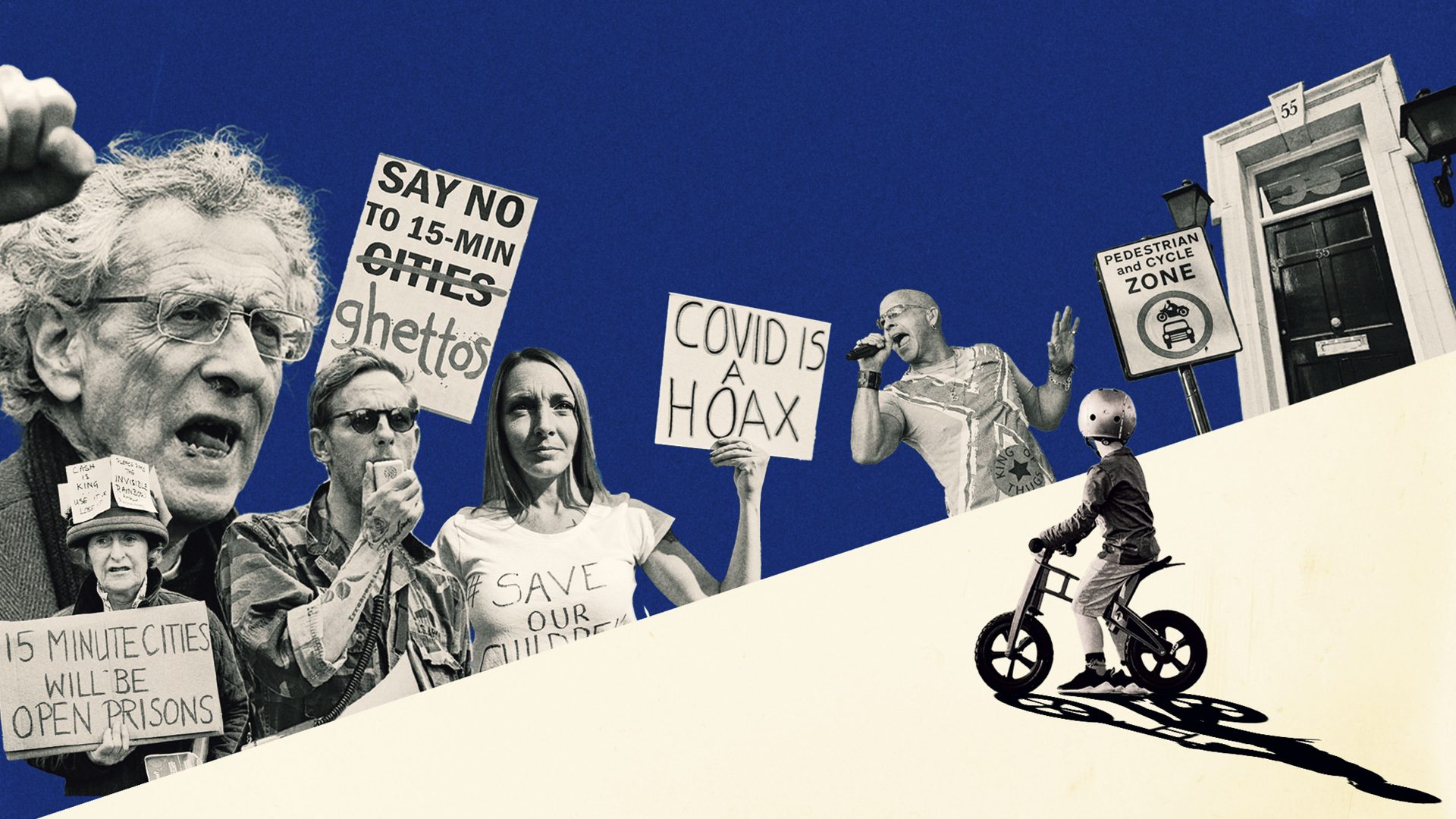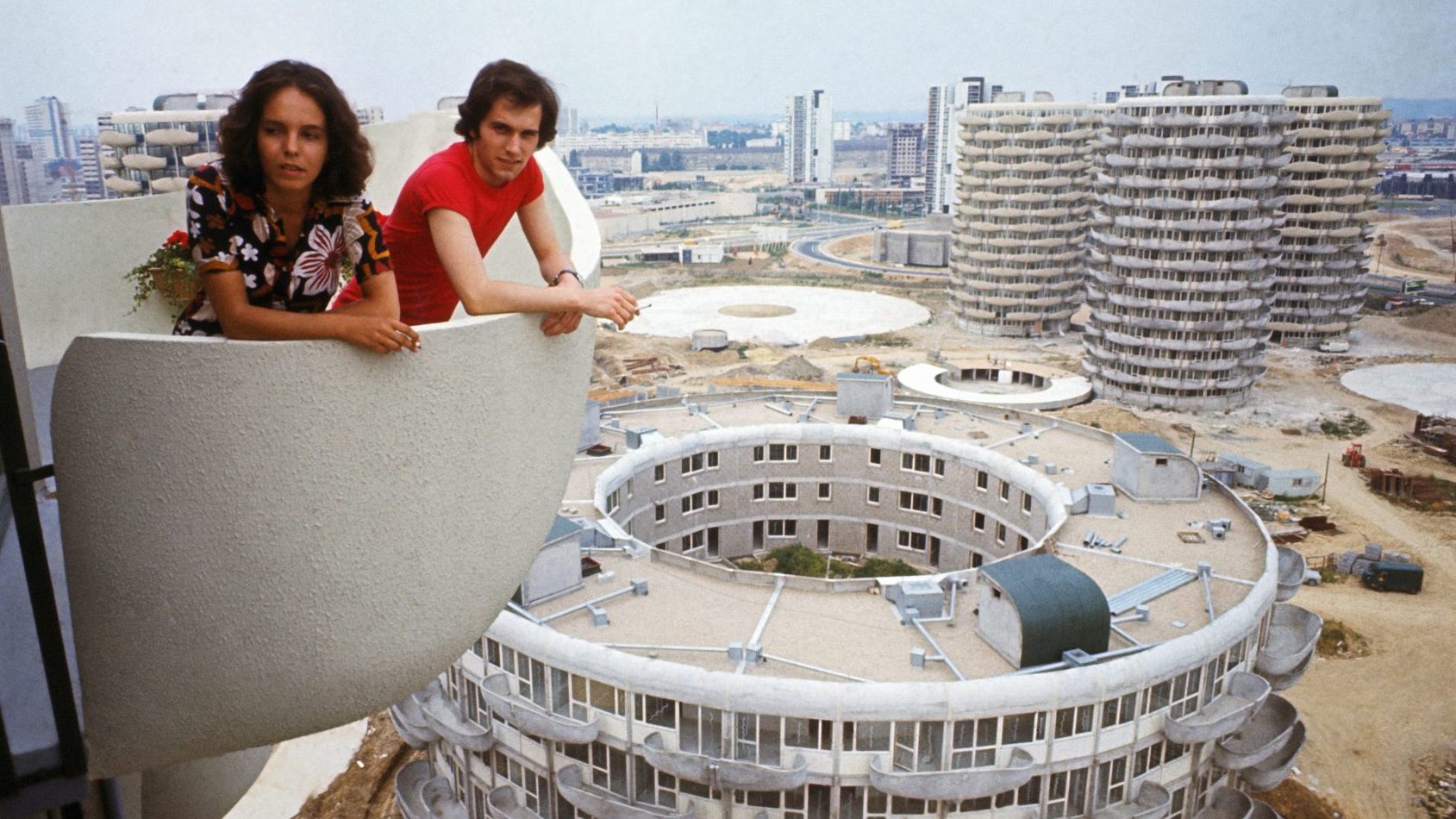How on earth did an urban planning model – the 15-minute city – spawn the fantasy that a shadowy cabal is aiming to lock the populace in their homes, denying us permission to move around freely and monitoring our every second? And why have these fears about a concept designed to cut pollution taken root in the city of Oxford?
One look at those who turned up to protest about this dystopian fever-dream in the city of dreaming spires last month – Laurence Fox, Piers Corbyn, the singer of Right Said Fred – makes it all too easy to dismiss the 15-minute city conspiracy theory as an absurdity too ludicrous to debunk. But we do so at our peril.
Many of those who gathered in Oxford were locals worried not about secretive elites seeking to control their movements, but about the city’s plans intended to protect its historic centre from traffic, ease congestion and parking problems and, in the era of net-zero, to help the environment. But inconvenience for residents in the name of a greater good is being twisted into something much more dangerous by those who want to undermine efforts to tackle the climate emergency. What happened in Oxford is the tip of an ever-growing, ever more hazardous iceberg.
Abandoning the UK’s commitment to cut greenhouse gas emissions to net zero by 2050 might seem ridiculous, but then the idea of Britain leaving the European Union was also once a fringe obsession. If you scratch beneath the surface of the 15-minute city fearmongering, you will find similar motives, similar moves and some of the same players.
And beneath the players, the played – a group of ordinary people who bristle at what they see, or are told by social media to see, as attempts to curb their personal freedoms. Some supported Brexit because they did not like to be told what to do by Brussels; some opposed Covid lockdowns and vaccinations because they did not want to be told what to do by Westminster.
“We’ve seen a combination of people who have deliberately manipulated the situation and misrepresented the facts and have caused outrage among people… who have probably not realised that they have been manipulated,” says Bob Ward of the Grantham Research Institute on Climate Change at the London School of Economics. “The fact that (the 15-minute city conspiracy theory) is rising shows we are not doing a good enough job of engaging that fringe and they are now open to this kind of cynical manipulation… We have to be very careful not to ignore this because it can escalate and it can become very dangerous, and we should be tackling it.”
The QAnon story from the United States offers a sobering reminder of the power of false narratives: the theory that a group of Satanic paedophiles was operating a global child sexual abuse trafficking ring from the basement of a pizza parlour had no basis in fact, and yet you can draw a line from the first messages appearing from the alleged deep-throat insider, Q, on 4chan in 2017 and the 2021 attack on the Capitol after former president Donald Trump claimed the election had been “stolen”.
“You can’t hand on heart say that what happened in the United States could never happen here because many of the elements are present. We don’t have a figure like Donald Trump, but it doesn’t mean a figure like Donald Trump could never emerge,” Ward says.
The thing about conspiracy theories is that by their very nature they are almost impossible to knock down. Any presentation of contradictory facts is dismissed as part of the plot.
Stephan Lewandowsky, professor of cognitive science at the University of Bristol, says contradictions are key characteristics of conspiratorial rhetoric and cognition. “(Conspiracy theorists) are holding 16 random beliefs and eight are in complete contradiction to the other eight… It’s almost impossible to have a rational argument with people who are deep down the rabbit hole… the only thing that holds everything together is this deep resentment and distrust.”
The 15-minute city conspiracy says that a decades-old urban planning concept meant to make our cities more liveable and less polluted is in fact an international socialist plot run by a capitalist cabal to create a surveillance society that will make George Orwell’s 1984 look like a fairytale. Behind this dystopia, the argument goes, is a shadowy elite determined to deprive people of their freedoms in the name of fighting climate change.
The theory that we could create more liveable cities has been around for decades, but its latest iteration is the brainchild of French-Colombian professor Carlos Moreno, director of Pantheon-Sorbonne University’s ETI Lab, who conceived of the model as a way to reduce emissions.
When Moreno laid out his idea to me in an interview for the New European last December, it didn’t sound particularly evil: “The 15-minute city idea involves developing more social interactions and economic integration, relocalisation of jobs, developing more quiet public spaces and transforming streets so they serve humans rather than cars.”
It seems a no-brainer, but in February hundreds of people marched through the streets of Oxford to voice their opposition to this model, which has somehow become synonymous with traffic restrictions causing problems for some car owners in the city. There isn’t in fact a direct link: Oxford has said it hopes to be a 15-minute city by 2040, but as the fact-checking organisation Full Fact states: “The traffic filter scheme is separate to the ‘15-minute neighbourhoods’ proposal being considered as part of Oxford City Council’s Local Plan 2040, which won’t confine residents to their local area.” Authorities in Bristol, Birmingham, Canterbury, Ipswich and Sheffield have also said they hope to bring in a 15-minute city plan. It is also being implemented in cities around the world, including in Paris.
The February protest in Oxford exposed the witches’ brew of misunderstandings and deliberate misinformation that has fuelled popular anger.
Some marchers carried mass-produced banners reading “Free Our Streets” and “Take Back Democracy” and “#Together”, a reference to the campaign group The Together Declaration, which styles itself as a grassroots anti-authoritarian movement set up to protest against the Covid lockdowns.
The anti-vaccination activist Piers Corbyn said he was at the march to oppose smart cities, all zoning, LTNs and clean air zones. “They’re all about controlling you and promoting the climate con. There’s no such thing as man-made climate change and that’s being used as an excuse to justify all sorts of tyrannical moves,” he said.
A 12-year-old girl, identified online as Jasmine, took to the stage to rail against “digital ID facial recognition zones,” which, she claimed, would prevent her from visiting her friends. To the delight of the crowd, she called out Klaus Schwab, head of the World Economic Forum and a favoured target of those propagating the idea of a malicious global cabal, for creating a digital surveillance prison.
“We all know where this is leading,” she said. “These are the first steps of a dystopian reality called 15-minute neighbourhoods. From a small seed a huge tree can grow. Climate change is being used to control us, to nudge us in the direction the greedy people want us to go.”
LSE’s Ward says that although some of these ideas are clearly wrong-headed, their proponents should not be blithely dismissed. Because ignoring people is what got us here in the first place.
“I think they are fundamentally wrong, but at the heart of it, being concerned about the limits of government intervention in your life is a legitimate and important discussion… It’s a sign of something we have to be very careful about. Part of their motivation is that they feel they are being ignored, so that sense of grievance is strong,” he said, adding that efforts should be made to engage with them.
“That doesn’t mean agreeing with them, but addressing their underlying concerns. At the moment, car owners particularly feel they are being persecuted. And people who rely on their car for their livelihoods essentially feel that the government is making their lives more difficult and there is credibility to their claims. If you are poor and you own a car, increased taxes or restrictions on how you go around your life is a legitimate complaint… we need to find a better way of engaging these people because just leaving them disconnected is where you get extremism.”
Oxford’s role as ground zero for this battle seems to date back to a December post on Watts Up With That?, a climate change denial blog run by Anthony Watts, who is American. It claimed Oxford residents were going to be put in a “climate lockdown” and confined to six zones behind electronic gates. As the story went viral, threats were made against Oxford’s councillors, prompting the city and county council to put out a statement to calm the growing storm.
The statement explained that they were actually proposing to install traffic filters on six roads in a trial due to start in 2024. Drivers would be encouraged to travel around the city by using the ring road or using public transport, rather than by just driving through it.
“The traffic filters are not physical barriers of any kind and will not be physical road closures. They are simply traffic cameras that can read number plates. If a vehicle passes through the filter at certain times of the day, the camera will read the number plate and (if you do not have an exemption or a residents’ permit) you will receive a fine in the post,” the statement said, adding that this was to ease “awful congestion” that was damaging the economy and environment.
The statement was accompanied by a video featuring Liz Leffman, the leader of Oxfordshire County Council.
“These conspiracy theories are causing real-world harm and need to stop. We have been receiving many calls and emails from worried residents in genuine fear that they might be locked in their own homes. This is categorically untrue and we are talking to you today to explain the truth, to reassure residents and set the record straight. We want to be absolutely clear we are not planning a climate lockdown or a lockdown of any kind,” she said.
But the forces ranged against the facts are powerful and they include Not Our Future, an organisation founded by David Fleming, a marketing and sales professional who also set up the Covid19 Assembly and the Together Declaration – to “fight for the survival of our way of life as we know it”.
Before the February protest, the group, which is fronted by 90s pop brothers Richard and Fred Fairbrass of Right Said Fred, distributed leaflets urging residents to mobilise.
“I know this sounds a little harsh but the reality is that in 2024 you, the people of Oxford, will be guinea pigs,” the leaflet read. “You will all be subjects of a scheme known as 15-Minute Neighbourhoods. This sounds cute but it’s anything but. It’s a controlled system to restrict people from driving freely around the city,” it said, before going on to misrepresent the traffic measures. But the leaflet’s true purpose was made clear just a few paragraphs later.
“In fact, all this is coming from the United Nations Agenda 30. This includes the ultimate aim of moving the majority of the public to smart cities where all activity can be monitored to control people’s Personal Carbon Allowance,” it continued. “Achieving NetZero by 2050 will destroy our way of life.”
The investigative journalism organisation DeSmog said Not Our Future was backed by “a network of high-profile climate deniers and conspiracy theorists based in the UK, Canada, the United States and Australia”.
Founding signatories listed on Not Our Future’s website include Kathy Gyngell, a trustee of the Tufton Street-based Global Warming Policy Foundation (GWPF), the UK’s main climate science denial group, which also campaigns as Net Zero Watch; the veteran climate denier James Delingpole; the actor Laurence Fox, head of the Reclaim Party; and prominent Australian climate denier Peter Clack.
On its website, Not Our Future says: “The draconian and destructive response to Covid-19, involving the lockdown of entire populations, mandated injections and mask-wearing, and aggressive suppression of freedom of expression, could be a harbinger of things to come”.
Governments around the world are laying the tracks for a bleak and authoritarian future, it says, warning of “de-industrialisation caused by the NetZero energy crisis”, the censorship of news and facts in the public interest, the propagation of divisions in society via identity politics, and the use of digital IDs and “programmable Central Bank Digital Currencies, which have the potential to lock humanity in a dystopian control grid; a de facto prison”. These are just some of the “threats” it identifies.
What makes this so worrying is the way it feeds into existing opposition to net zero policies from some politicians, including elements of the ruling Tory Party, notably those in the Net Zero Scrutiny Group (NZSG), which has sought to undermine the UK’s net zero commitment by suggesting it will make people poorer and threaten energy security.
The group, founded by Nigel Lawson, is said to include Northern Ireland minister, GWPF trustee and newly lachrymose ‘Brexit hard man’ Steve Baker, as well as MPs like Esther McVey. Veteran Brexiteer Peter Lilley, now in the Lords, is also aboard. Last year, the Guardian said its analysis found that more than half of the members of the NZSG were members of the European Research Group (ERG).
And then there is the Reform Party, founded by Nigel Farage and now run by Richard Tice. It has placed opposition to net zero policies at the heart of its offer to the electorate, and although it currently only polls around 9%, Ward warns this could change because there is evidence that its message is gaining traction.
“At the moment, polling shows that about 40% of the population would support a referendum on net zero, which is shocking, but again it’s a sign that we are doing a bad job. The language around net zero is mystifying and (the Reform Party) is portraying it as a government target that has been set arbitrarily,” he said.
The problem is that in a post-truth political landscape, false narratives around net zero and other climate change-battling policies can thrive.
Lewandowsky said: “There are a lot of vested interests and a lot of political capital that are unhappy about net zero because it cuts into profits or a way of life and they think we can’t afford it. It is impossible to anticipate whether they will prevail. Who knows. It certainly isn’t helpful to have this stuff going on.”
Ward says we should change the discourse by replacing “net zero” with “stopping climate change” because he believes this would enable the case to be made more clearly. Otherwise, net zero could become a political football with potentially devastating consequences – after all, we’ve been here before with Brexit.
“It’s not inconceivable that an embattled Conservative prime minister might feel that one way of shoring up the right going into an election is to promise a referendum on net zero. That’s what happened on Brexit. Could you guarantee it wouldn’t happen again?”




